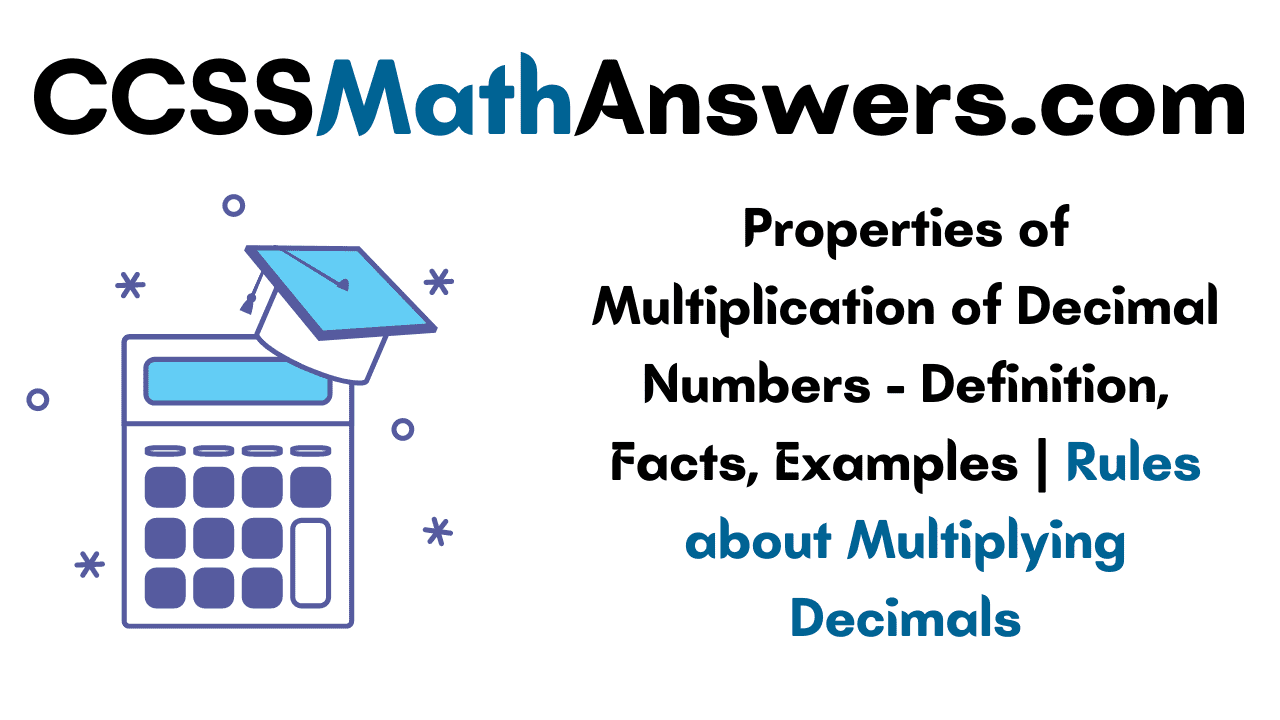In this article, you will learn in detail about the Properties of Multiplication of Decimal Numbers, Some examples, and so on. Students who want to multiply the decimal numbers either by decimal numbers or whole numbers must have to know the properties of the Multiplication of Decimal Numbers. The method of multiplying the decimal numbers is the same as the multiplication of whole numbers.
Also, Refer: Problems on Multiplication of Decimal Fractions
What is a Decimal?
In mathematics, a Decimal Numbers will be defined as one type of number, which has an integer part and a fractional part is separated by a dot. The dot in between a whole number and a fractional part is called a decimal point. The digits followed by the decimal point show a value is always smaller than one.
Types of Decimals:
There are two types of decimals, namely:
1. Recurring Decimal Numbers
2. Non- Recurring Decimal Numbers
Recurring Decimal Numbers – These Decimal Numbers are Repeating or Non-Terminating Decimals.
Examples of Non-Terminating Decimal Numbers are 2.123123 (Finite) and 4.252525252525… (Infinite).
Non-Recurring Decimal Numbers – These Decimal Numbers are Non Repeating or Terminating Decimals.
Examples of Non-Recurring Decimal Numbers are 5.14812 (Finite), 2.5428454845…. (Infinite).
What is Multiplication of Decimal Numbers?
Multiplication of decimal numbers is defined as first multiply as if there’s no decimal and then count the number of digits after the decimal in each factor. After that, put the same numbers of digits behind the decimal in the product.
Properties of Multiplication of Decimal Numbers
The below given are Properties of Multiplication of decimal numbers:
- When we multiply the decimal number with zero then the product value is zero.
- The product of a decimal number and a whole number multiplied in any order remains similar.
- The product of two decimal numbers remains similar, even though the order is modified.
- The product of decimal fractions and 1 is the decimal fraction itself.
- When you perform multiplication in decimals, the numbers will be taken in any order and therefore the product will always remain the same.
Problems on Multiplication of Decimals
Problem 1:
Find the final product value of 3.77 x 2.8
Solution:
As given in the question, the values are 3.77, and 2.8.
If the order of numbers is changed, then also the product of two decimal numbers remains the same.
Now, multiply the values and write the product value.
So, the product value is,
3.77 x 2.8 = 10.556
If the order is changed,
2.8 x 3.77 = 10.556
Both the values are the same.
Therefore, the final product value is 10.556.
Problem 2:
Find the following product values:
(i) 1 x 7.61
(ii) 8.32 x 1
(iii) 1x 5.98 x 1
Solution:
Given in the question,
(i) 1 x 7.61
The product of decimal fractions and 1 is the decimal fraction itself.
So, the product value of given numbers is,
1 x 7.61 = 7.61
(ii) 8.32 x 1
Now, we have to find the product value.
The product of decimal fractions and 1 is the decimal fraction itself.
So, the product value is
8.32 x 1= 8.32
(iii) 1 x 5.98 x 1
The product of decimal fractions and 1 is the decimal fraction itself.
Thus, the product value is
1 x 5.98 x 1 = 5.98
Problem 3:
If the cost of 1 book is Rs. 18.10. Find the cost of 4 books?
Solution:
Given,
The cost of 1 book is, Rs.18.10
Now, we have to find the cost of 4 books using the multiplication method.
So, the cost of 4 books is,
Rs.18.10 x 4 =Rs. 72.4
Therefore, the cost of 4 books is Rs. 72.4.
Problem 4:
What are the values of the following:
(i) 101.54 x 0
(ii) 654.3 x 0
Solution:
As given in the question, the values are
(i) 101.54 x 0
Now, we have to multiply and write the value.
The product of decimal fractions and zero is zero.
So, the values are,
101.54 x 0 = 0
Therefore, the given value product value is 0.
(ii) 654.3 x 0
Now, we need to find the product value using multiplication.
The product of decimal fractions and zero is zero.
Thus, the product value is,
654.3 x 0 = 0
Problem 5:
What is the multiplication value of a given number? The value is 3.5 x 1.7 x 75.3.
Solution:
As given in the question, the value is 3.5 x 1.7 x 75.3
Now, using the multiplication method we need to find the value.
So, the values are,
3.5 x 1.7 x 75.3 = 3.5 x (1.7 x 75.3) = 448.035
When you perform multiplication in decimals, the numbers will be taken in any order and therefore the product will always remain the same.
Therefore, the multiplication value of 3.5 x 1.7 x 75.3 is 448.035
FAQ’s on Properties of Multiplying Decimals
1. What is the Multiplication of decimal numbers?
Multiplication of decimal numbers is defined as first multiply as if there’s no decimal and then count the number of digits after the decimal in each factor. After that, put the same numbers of digits behind the decimal in the product.
2. What are the four rules of decimals?
Four basic rules (or) operations involving decimals are addition, subtraction, multiplication, and division.
3. If a decimal fraction is multiplied by a 1, what will be the product value?
When the decimal fraction is multiplied by 1, the product value is the decimal fraction itself.
